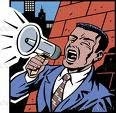"There's a lot we can do. We're not going to be thrown into prison and face torture. We're not going to be assassinated. We have enormous privilege and tremendous freedom. That means endless opportunities. After every talk I give in the United States, people come up and say, "I want to change things. What can I do?" I never hear these questions from peasants in southern Colombia, Kurds in southeastern Turkey under miserable repression, or anybody who is suffering. They don't ask what they can do, they tell you what they're doing. Somehow, the fact of enormous privilege and freedom carries with it a sense of impotence, which is a strange but striking phenomenon. The fact is, we can do just about anything. There is no difficulty in finding and joining groups that are working hard on issues that concern you. But that's not the answer that people want.
The real question people have, I think is, "What can I do to bring about an end to these problems that will be quick and easy?"
[Note: When I was volunteer coordinator for an NGO in India, this was exactly the approach of so many would-be volunteers, who would turn up bright-eyed and gung ho, but never show up again after that initial talk about the actual nitty, gritty details...]
I went to a demonstration, and nothing changed. Fifteen million people marched in the streets on February 15, 2003, and still Bush went to war; it's hopeless. But that's not the way things work. If you want to make changes in the world, you're going to have to be there day after day doing the boring, straightforward work of getting a couple of people interested in an issue, building a slightly bigger organisation, carrying out the next move, experiencing frustration, and finally getting somewhere. That's how the world changes. That's how you get rid of slavery, that's how you get women's rights, that's how you get the vote, that's how you get protection for working people. Every gain you can point to came from that kind of effort - not from people going to one demonstration and dropping out when nothing happens or voting once every four years and then going home. It's fine to get a better or maybe less worse candidate in, but that's the beginning, not the end. If you end there, you might as well not vote. Unless you develop an ongoing, living, democratic culture that can compel the candidates, they're not going to do the things you voted for. Pushing a button and then going home is not going to change anything."
Noam Chomsky
Wednesday, September 3, 2008
Subscribe to:
Post Comments (Atom)

No comments:
Post a Comment